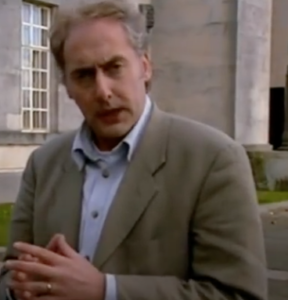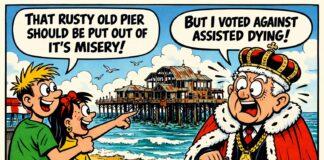- Death wish two - 2nd March 2026
- News to celebrate! - 1st March 2026
- Bombs away! - 28th February 2026

During 23 years with the BBC, and in a 42 year journalistic career (when he was trained to use clear and simple language, avoiding jargon), for our Editor, Welshman Phil Parry, covering major political stories (such as last week’s election result in Caerphilly) was pivotal, and as he has seen many times – more evidence is now emerging of how senior politicians cling on to power in the face of what is happening.
It’s embarrassing to watch…
I’ve looked on as senior politicians seem to become so drunk on power that they cling on to it, despite what is taking place around them.

Let me give you a few examples. We saw it in spades during the administration of Theresa May at a UK level, as she struggled to hold her party together over Brexit, then unbelievably lost her majority in the 2017 General Election (GE) she called after being told that her opponent was such a lefty she was bound to INCREASE it.
Let me remind you of what happened – the Conservatives (who Ms May led) returned 317 MPs, which was a net loss of 13 seats compared with 2015.
I have NEVER seen anything like it!

It could be argued that we have witnessed something of the same in Wales with a myriad of coalitions and deals as First Ministers (or First Secretarys) sought to stay in (or be elected to) power with political ‘partners’.
For instance – the original Rhodri Morgan government was formed on 16 October 2000, and was a coalition with the Liberal Democrats, officially referred to as the ‘Coalition PARTNERSHIP’ .

Then there is the Welsh nationalist party Plaid Cymru (Plaid) (the winner at Caerphilly last week). Their politicians served as ministers in another coalition government with Labour in Cardiff Bay from 2007 to 2011.
Mr Morgan even defended the use of coalitions in a report (saying that they reflected what people wanted, and certainly NOT that they were used as a means of getting power).
Cardiff Central Liberal Democrat MP Jenny Willott, who served as a junior minister in a UK coalition government, said in it that they had proved they could work, although to critics this might sound disingenuous.


The real evidence of this reluctance to relinquish power, though, comes on the international stage.
The situation for the Spanish Prime Minister today, Pedro Sánchez, who has been in position since 2018, looks particularly bleak because he has also been badly hurt by a major corruption scandal, yet STILL he clings to power…
The two men he picked to run the Socialist Party for him since he took over both now face trial for taking bribes on public contracts (which they deny).
Recordings indicate that one of them even hired sex workers together with an associate, which is seen as hypocritical in a party that proposes to ban prostitution.

On Mr Sánchez’s orders, he (along with others) ruthlessly sidelined critics inside his party, so he has few to blame for things now going wrong.
Polls show that Spaniards are more disillusioned with their politicians than any other Europeans, apart from Bulgarians, Greeks and Slovenes.
Mr Sánchez has repeatedly apologised for his aides’ transgressions, but that has not been enough to restore faith in Spanish democracy.

He is, though, apparently determined to stay in power – perhaps he likes all the trappings that go with being the Prime Minister, like using the palace he has been gifted by the taxpayer.
Yet Mr Sánchez is ever more vulnerable to policy blackmail, because there is a LOT of internal party strife.
There could be more strife generally if we continue to see people determined to cling on to power, who use all the things they have been given by the taxpayer, despite the evidence around them!

The memories of Phil’s extraordinary decades long award-winning career in journalism (when he often saw senior politicians determined to stay in the job), as he was gripped by the rare neurological disabling condition Hereditary Spastic Paraplegia (HSP), have been released in a major book ‘A Good Story’. Order it now.
Tomorrow – more political stories, and how after the shock victory by Welsh nationalist party Plaid Cymru (Plaid) on Thursday, the focus is today on Labour, with an increasing number of the party’s politicians saying Sir Keir Starmer’s position now looks untenable.
Next week – news now that the two-child benefit cap will be scrapped in next month’s UK budget this month is likely to be welcomed by Wales’ First Minister, who has called the restriction “damaging”, although she may be less pleased by the dire warnings of the consequences if the Welsh one does not pass.










